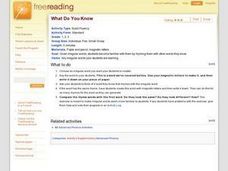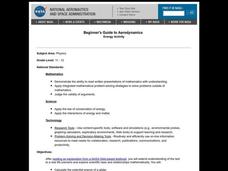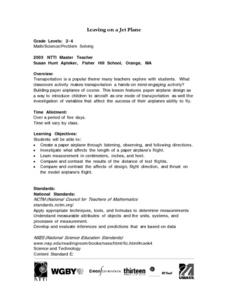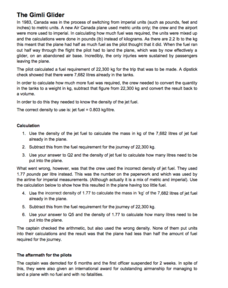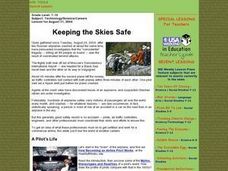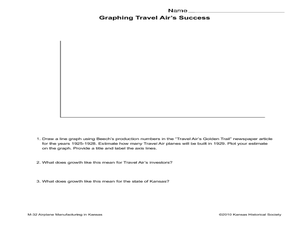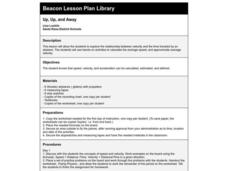Curated OER
What Do You Know!
Students experiment using a compass for navigation and consider how various instruments affect how we travel.
Curated OER
Center of Gravity Problem Set
Pupils read a NASA Web-based text, then demonstrate an understanding of the text by using it to complete an activity on the center of gravity of a commercial cargo airplane.
Curated OER
Energy Problem Set
Students calculate the potential energy of a glider, the kinetic energy of a moving glider and the change in velocity when potential energy changes to kinetic energy.
Curated OER
Turbojet Thrust
Students, after reading the Web page Turbojet Thrust and completing the activity, explain how jet engines use air to produce thrust. The educational software ""FoilSim" is used in this lesson to help students calculate thrust.
Curated OER
Things That Fly
Students examine animals that can fly and discover that those animals need wind and wings to be able to leave the ground. They create a chart with two sides and they divide animals and objects that fly.
Curated OER
Leaving on A Jet Plane
Young scholars create an airplane by listening to directions. They also to measure the pieces for the airplane and compare and contrast their test flights.
Curated OER
Amelia Earhart: Aviation Pioneer
Students explore social practices and technological advancement of the 1920s and 1930s and relate this to modern life. They explore the events of Amelia Earhart's life and her poetry. They write their own poetry.
Teach Engineering
Windy Tunnel
Lift—it is about the wing's attack. Using a virtual wind tunnel, pupils investigate wing shape and angle of attack. Learners use worksheets to record their observations and to convert verbal relationships into mathematical equations in...
NASA
Introduction to Real Air Traffic Control—Problem Set A
Understand what it takes to control planes safely. The first lesson in a series of six introduces the class to the air traffic control situation. The pupils develop their understanding of units used in air travel, then learn how to read...
Royal Society of Chemistry
Gimli Glider—Anecdotes for Chemistry Teachers
What's the moral of this story? Units save lives! Teach measurement conversion through storytelling in a quick math-based lesson. Young scientists learn how one country's decision to swap from imperial to metric standard units caused an...
Curated OER
How Things Fly
Middle schoolers conduct a series of hands-on experiments that help them explain the role of lift in fixed-wing flight. They observe the flow of air and water around several surfaces and then consider the dynamics of airflow around an...
Curated OER
How Things Fly
Students observe photographs of selected twentieth-century aircraft at the National Air and Space Museum and note differences in the design of aircraft wings, fuselages, and engines.
Curated OER
Keeping the Skies Safe
Students study how aviation professionals get certified to work for a commercial airline. They research how these professionals coordinate their skills to keep the skies safe for travelers.
Curated OER
The High and the Flighty
Students study women aviators and act out a talk show-style interview with one of them. They plot Amelia Earhart's flights on a map.
Curated OER
Airplane Manufacturing in Kansas
Seventh graders determine how Kansas become a producer of airplanes. In this Kansas history instructional activity, 7th graders read selected Read Kansas! cards and articles. Students then discuss the primary sources they read regarding...
Curated OER
Spies That Fly
Students view a video clip about spy planes. They identify the challenges engineers face in building small aircraft. They complete a worksheet to end the lesson.
Curated OER
Up, Up, and Away
Learners study the concepts of speed and velocity and complete practice problems. In small groups, students fly airplanes and record time and distance traveled for each flight. They calculate the speed and velocity of their plane for...
Curated OER
Retiring Helicopters
Students discover how helicopters work through an interactive program. They also examine why helicopters are more difficult to fly than airplanes. They discover the history of the helicopter and how it has been used in military operations.
Curated OER
Variables and Controls in an Investigation
Seventh graders identify variables and controls in a paper airplane investigation. In this scientific method lesson, 7th graders conduct an experiment to determine the variables that affect the flight of paper airplanes. They design an...
Curated OER
Rotocopters
Young scholars construct their own rotocopters to study flight. For this flight lesson students work in groups and complete timed trials of their rotocopters.
Curated OER
Banana Man Glider
Students incorporate technology into the classroom as they investigate force and motion. In this science lesson, students construct a glider to be able to safely take a banana to the ground without dropping it. They investigate flight,...
Curated OER
Kite building activity
Students explore how a kite flies; this instructional activity is a precursor for the windmill activity. By exploring how a kite flies, the students explore the power of the wind; particulary how drag, lifft and gravity enable objects...
Curated OER
What Makes Thing Fly?
Second graders study lift, drag and thrust from a real flight instructor. In this physical science lesson students build and fly paper airplanes and experiment with variations and design.
Yale University
Airplane Mathematics
The history of aerodynamics is rich with experimentation and international collaboration. Author Joyce Bryant relays this dynamic past and provides math word problems using the formula of lift, the force that makes airplanes fly. She...
Other popular searches
- Flight, Aviation
- Flight Aviation
- Flight, Aviation Powerpoint
- Flight Aviation Powerpoint
- Flight, Aviation Activities
- Flight Aviation Activities
- Aviation Flight Trainging


